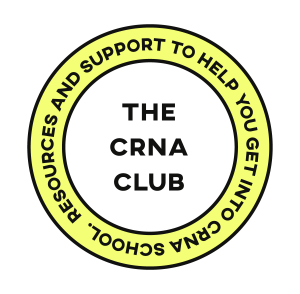Asking for letters of recommendation (LOR) can be daunting! Especially if you feel as though your unit *may not* support your decision to pursue higher education (I know this is how I felt!) I’m hoping this post can bring you some insight on how to navigate this, instill some confidence that it IS possible to receive LORs for your application, and make the overall process of asking less stressful.
Stay Organized: Tracking CRNA School LOR Requirements
First and foremost, organize alllll of the programs you are applying to and make note of what kind and how many LORs each program wants (because each school is unique and may want different types of letters). Organization early on will help set you up for success! For example, I applied to 3 schools in a given application cycle – here is the breakdown of LORs for each:
School A: 3 favorable evaluations/recommendations are acceptable from at least two of these categories:
- Current clinical supervisor
- Fellow critical care nursing peer or anesthesia provider
- Academic faculty or clinical educator familiar with your academic performance
School B: 3 peer recommendation ratings
- Online survey
School C: 3 letters
- Spiritual advisor or pastor
- Immediate Supervisor in the critical care area in which you are currently working
- Critical care/ICU co-worker
Who to Ask for Letters of Recommendation for CRNA School - Examples
- Current clinical supervisor – I used my relief charge nurse for this! I was closer with her, and she had seen me grow from my nursing fellowship in the ICU, to a new grad RN in the ICU, to my current practice,
- Fellow critical care nursing peer or anesthesia provider – for this one, I chose to ask the CRNA I shadowed multiple times. Shadowing was SUPER important to this particular school, and so I wanted to showcase that I had put in the work of shadowing. Word of caution: make sure you ask someone you have developed a relationship with, someone who can speak on your behalf.
- Academic faculty or clinical educator familiar with your academic performance – Since I was still in communication with my ICU instructor from my BSN program, I asked her to write this letter. BUT if you’ve been out of school awhile, a letter from your unit educator is also great! Especially if you’re involved with Unit Practice Council.
- 3 peer recommendation ratings – this one was east. I picked 2 different people on my unit (one relief charge) that have seen me grow in different capacities, and then asked my mentor who I worked with briefly that was also in CRNA school herself.
- Spiritual advisor or pastor – this one was a little tough for me, since I am not religious myself. However, I frequently had conversations with the Chaplain that would visit our patients in the ICU, and he was happy to write me a letter.
- Immediate Supervisor in the critical care area in which you are currently working – for this, instead of asking my charge nurse, I asked my relief charge nurse who knew me on a more personal level.
- Critical care/ICU co-worker – easy! Pick anyone who has some more experience than you that can speak highly on your behalf.
Tips for Getting Strong Letters of Recommendation for CRNA School
- Ask EARLY! I asked about 8 weeks in advance to give them adequate time to write the letters and submit them (we’re all busy!)
- Ask multiple different people for letters! I personally didn’t want to overburden one person with the task of writing a letter for each program. So, I started making a list of each person I thought would be a valuable addition and person to ask, someone I knew would support me on these endeavors.
- Tailor who you ask to the school you’re applying! As mentioned, one school gave me the option of ICU peer or anesthesia provider. I chose to go with the anesthesia provider because I knew the program valued shadowing and was lucky enough to shadow someone consistently to gain a more personal relationship.
- If the program is asking for a specific LOR, for example from your ICU director but they do not write/endorse letters (yes, I have heard of units doing this!), then I recommend reaching out to the program to see if there is another person that the program would accept a letter from. Have an idea of the role you want to replace this requirement with, such as a charge nurse, nurse educator, etc.
- Tell your LOR person that the due date is actually a week (or more) BEFORE the actual due date! This helps make sure all of your documents are submitted in a timely manner.
- Check in with your LOR person every so often if you have not received confirmation that their letter has been submitted or if you have not received it. Gentle reminders of the due date are also helpful, asking if there is anything else they need help during the process. This is especially helpful for identifying IT issues with online submissions.
How to Ask for Letters of Recommendation: In-Person or Email?
I personally wanted to ask each of my letter writers in person. If this isn’t an option for you, then writing out a detailed email or text is also an option. Once I asked them in person, I sent them a follow-up email that included all of the necessary information I thought they would need to reference to write an outstanding letter! Feel free to use mine as an example (see below).
Example Letter of Recommendation Request for CRNA School:
Hi [Name]!
Thank you again for agreeing to write me a letter of recommendation for CRNA school.
Attached to this email is:
- My most current resume.
- The essay responses I wrote for my application - addressing questions such as why do I want to become a CRNA, etc (in case you want to add on to anything in your letter).
- The list of schools with the deadlines and important info on how to submit the letters/what the school is looking for in the letter. (see below)
[Add some personal details here of what you would like them to include:
I would love if you could speak on my behalf coming from the perspective of starting in nursing school as my preceptor for my capstone in the ICU, to where I am now on the unit as an RN, highlighting my growth from nursing student into RN on the floor. It would also be helpful if you touched on how you’re a relief charge nurse and how you’ve worked with me in a supervising role.]
I will keep you updated as I start to enter your information on the apps when they open and when I submit the app from my end. Please let me know if you have any questions, or if there is anything else I can do to aid in this process.
Sincerely,
[Your Name]
Deadlines and Important Info Examples:
| School | Due Date | How to Submit | Referrals Role & Key Features to Include (If Any) |
| [School] | [Date] | You will receive an email when I submit my application and will be asked to fill out a survey. | Role: Current clinical supervisor. This particular school is looking for information regarding: Professionalism - Ex: how I started as an aid in CVICU, completed my nursing preceptorship in neuro ICU, and became a new grad in the neuro ICU - Also, what does our unit look like? They want to know I am caring for high acute patients. Ventilated, multiple pressers, hemodynamics, etc. Continued professional development - Ex: I joined clinical ladder and committees, I joined 2 committees my first year (only 1 is required), and I am involved in UPC - Ex: I achieved my CCRN and SCRN within my first year and half as a nurse, and I am a member of the AACN Volunteering - Ex: I volunteered at [Hospital] before I was a nurse’s aide, I did the Health Scholar Program. I also volunteer outside of work at my local animal shelter and am a strong proponent for a good work-life balance. |
| [School] | [Date] | Please email your letter as an attachment on an official Letterhead from [Hospital] to: | Needs to be written on Letterhead from [Hospital] |
| [School] | [Date] | - Please print out a hard copy of your reference, place it in a sealed envelope, and sign over the seal - Will pick up whenever convenient for you | Role: Immediate Supervisor in the critical care area in which you are currently working. |
I hope this has provided some insightful information on how and who to ask for letters of recommendation and how to stay organized while doing so. You CAN do this!
For more in-depth guidance, don’t forget to listen to The CRNA Club Podcast. Your future as a CRNA depends on your professionalism—make sure you stand out for all the right reasons!


